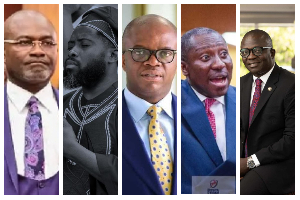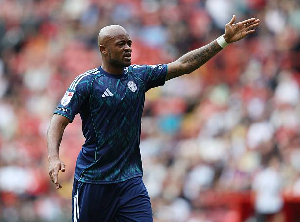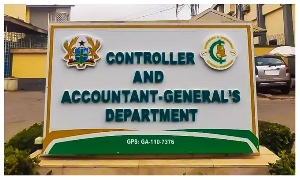AMMENDED CONSTITUTION
The April Congress of the NDC amended the party?s constitution in many interesting ways. The amended constitution requires that the party?s Presidential Candidate for an upcoming election be chosen 24 months before the election. It also made provision for a separation of the positions of Founder and Leader of the party. Prior to this amendment, President Rawlings was both the founder and the leader. Therefore by the terms of the amended constitution whoever emerges as the candidate from the special congress tomorrow, becomes the effective leader of the NDC. Choosing a candidate so long before an election certainly makes sense for a political party in opposition. It settles the issue of leadership early enough, in order to give sufficient time for any bruised egos to be assuaged or factional tensions to be quieted before entering into the election. It also gives the elected candidate sufficient time to work the electorate. It allows enough time for the candidate to criss cross the country, be introduced to the electorate and put his message across.
The circumstances are somewhat different for a governing party. An early selection of candidate could be potentially distracting. It is also too early to judge performance of an incumbent president who is also vying for candidacy. This could therefore discourage potential contestants, as is presently the case with the NPP, as Kufuor coasts unopposed to winning the flagbearership of the party for 2004.
THE CANDIDATES
At the close of nominations, only two candidates had emerged - Professor J.E.A. Mills and Dr. Kwesi Botchwey. Probably the caliber and qualification of the two personalities deterred additional potential contestants from coming forward. Talk of a northern candidature represented by Alhaji Mahama Iddrisu, also well qualified, fizzled out. This has reduced the contest to a fierce two-cornered fight. Professor Mills and Dr. Botchwey are two personalities whose backgrounds and career paths have been so similar. Both are Fantis, and both were lecturers in Law at Legon and were indeed classmates in school. In Law School both were students of Party Chairman Obed Asamoah. Both eventually found themselves in politics and served with some distinction in different capacities and at different times, one as Vice President and the other as Finance Minister. Both candidates come to the contest with a solid pedigree in terms of academic, professional and personal achievements. Despite these similarities the two are as different in personality as apples are from oranges.Dr. Kwesi Botchwey, the more flamboyant of the two, was a radical left wing law lecturer at Ghana?s premier university, Legon. For most students who went through the gates of Legon in the turbulent and highly ideological seventies and early eighties, Dr. Botchwey was one of a crop of young brilliant university lecturers who firmly believed in and expounded the theories of socialism. Together with Fui, Tsatsu, Takyiwa Manu, Kwame Karikari and other young radical lecturers, young fresh entrants into the university received a healthy dose of socialist indoctrination. Graduating from the socialist cell of Mr. Wentum Kitcher in sixth form years of secondary school, I came under the tutelage of Takyiwa Manu, together with my close friend and classmate Dr. Sulley Gariba. We studied the theories of Marx, Engels and Lenin and prepared ourselves for the coming socialist revolution in Ghana.
Dr. Botchwey?s special interest area was in the activities of transnational corporations. He spoke brilliantly and convincingly about the predatory activities of transnational corporations and how their activities impoverished the developing world. It does not matter that in later years he had to accept investments of transnational corporations as a necessary requirement for acceleration of the national economy. Still many of his points about the ill effects of transnational corporations remain valid and are playing out in the Western Region and other gold mining areas of this country.
Perhaps the aspect of his career history for which he is best remembered is his 13-year stint as Finance Minister. He shepherded Ghana through the years of economic recovery and structural adjustment. As a result of the necessity to restructure the national economy, his budgets were feared because of the stringent austerity measures that accompanied them.
He fell out with President Rawlings, resigned his position as Finance Minister and took up an appointment as a Lecturer at the famous Harvard University.
Professor Atta Mills is the more reserved of the two. Soft-spoken and deeply religious, he was also a well known and well liked Law lecturer on the Legon campus. His extra curricula interest and exploits were in the field of sports. An excellent hockey player, he also took great interest in football and rose to become part of the management of the Accra Hearts of Oak Football Club. As a young student in Legon I remember him to have been the Chairman of the University Sports Associations for quite a long tenure. Although not radical and deeply steeped in socialist politics, he had a CPP orientation and believed in the ideals of Dr. Kwame Nkrumah.
He was drafted from campus in the early 90s to serve as Commissioner of the Internal Revenue Service. He handled this position with distinction and is remembered for introducing strategies to bring more of the informal sector into the tax net by the introduction of flat daily or quarterly income tax levies. In the elections of 1996, he was selected as the running mate to President Rawlings and became Vice President upon NDC?s victory at the polls. He brought a lot of dignity, equanimity and level headedness to the Presidency. While perceived by most as soft and humble, he at times possesses a steely stubbornness on issues to which he takes a passion.
CAMPAIGNING
Both candidates have criss crossed the length and breadth of the country meeting with party delegates. They have carried a message of a new dawn in the NDC. A promise to allow greater internal democracy, a process that is actualized already by the current presidential contest and a reorganization of the party?s grass roots structures among many other things.While a lot of fear has been expressed about divisiveness in the campaign of the two candidates, I hold a contrary opinion and believe that this campaign has been a tea party, compared with the acrimony preceding the April contest for chairmanship of the party. A lot of credit of course goes to the two candidates, who have behaved in a very civil manner towards each other. The cause of tension has been more the frayed tempers of the followers and hangers-on of the two rather than any bad blood between them. Indeed slanging matches in the media have been principally between loyalists of the founder ex-President Rawlings and Party Chairman Dr. Obed Asamoah. As is very normal these tensions have heightened as the D-Day for the congress approaches. A lot of the tension has also been a creation of the media. Sections of the media with an avowed and declared dislike for the NDC have run screaming and often exaggerated headlines about chaos in the party and predicting its disintegration. As happened in the April Congress, a lot of the prophets of doom are going to be disappointed. The NDC will emerge from the coming congress more united and focused than it went into it. The bottom line really, is that all protagonist, whether Rawlings or Obed, realize that the NDC as a party is better off under a government headed by any of the two contestants, than under an NPP administration. Come Saturday, the party has the internal mechanisms to deal with any issues arising out of a victory of any of the two candidates.
There has been concern about President Rawlings campaigning for Professor Mills. Rawlings has never hidden his preference for Mills and so this is not surprising. The greater concern perhaps, is that in the event of a Mills? victory, there could be the attribution that he could not have won without the intervention of the ex-president. I daresay that Professor Mills is fairly capable of fighting his own battles.
NEW VISION NEW DIRECTION
This was the theme for the NDC Congress last April and has remained the guiding slogan for the party?s rejuvenation as a credible alternative to the ruling NPP. Having served an 8-year term and been preceded by the sister administration of the PNDC also headed by Rawlings, there is a lot of restructuring that needs to be done to put the NDC in shape for the electoral battle of 2004. Having had a long experience of governing, the NDC must draw from this experience and come out with a programme that recognizes the pitfalls and adversities of the current development paradigm based on a liberalized market driven economy characterized by an over reliance on foreign donor support.Early steps such as the reaffirmation of the party?s commitment to a social democratic philosophy of development seek to clearly identify the party?s position on the ideological plane. From this standpoint the necessary programmes can be spelled out aimed at winning the confidence of the electorate in the vision of a better future under an NDC administration.
There is also a yearning for an injection of fresh blood into the NDC. Years of media demonization have resulted in a discrediting of many NDC stalwarts in the eyes of the public. There is however a new crop of well qualified youthful faces in the NDC who will have to step forward to serve in any future NDC Government. There is a great potential on the Minority benches of the current Parliament that the party can draw from. There is an even larger pool outside Parliament that can serve the party well. The party must very quickly mobilize this human resource and utilize it in all the processes leading up to the elections of 2004. This must be the face of the new NDC.
PARTY FINANCES
Constraints in financing have been the bane of political party activity in this country. In the run up to both the April and December congresses complaints of lack of money have been made. Indeed there was media speculation that the congress will be put off because the nearly ?700 million needed for the organization of the congress was unavailable. Because of the high cost of political organization and campaigning, it is very difficult to realize all the money required for party organization from contributions of party members. Contributions by wealthy benefactors and businesses form a significant part of party finances. Such benefactors are more willing to contribute when a party is in power than when it is in opposition. They are also willing to contribute in the run up to an election based on who they perceive is capable of emerging victorious. But perhaps the most interesting and perverse are the political donors who hedge their bets by delivering donations to both sides.The resultant scenario is one where a party?s coffers are bulging with funds while in government and then turn empty when it finds itself in opposition.
Whatever it is, one of the challenges for the NDC after this congress, is putting in place a new fund raising machinery, and the creation of structures to ensure greater transparency and accountability in the handling of party funds.
NDC is currently in the spotlight and must make the best of this moment. Saturday will be a moment of magic for the NDC and all supporters are sitting on the edge of their seats while they wait to find out whether it will be a Mills or Botchwey candidacy.















